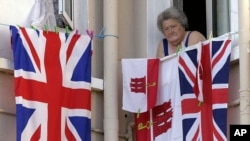Britain officially informed the European Union (EU) of its plans to leave the group last week.
The move came at a time when Britain is involved in a heated dispute with the EU and Spain over the future of the British territory of Gibraltar.
Many people think of Gibraltar as just a mountainous piece of land on Spain’s southern coast. For years, it has been known as "The Rock."
Once part of Spain, Anglo-Dutch forces captured Gibraltar during the War of Spanish Succession in the early 1700s. Spain’s rulers gave Britain control of the area in the Treaty of Utrecht. The Rock has been a source of tension ever since.
Last week, the European Union published guidelines for negotiations between EU and British officials. The document states that any deal between the two sides won’t affect Gibraltar, unless Spain agrees to it.
The EU’s inclusion of Gibraltar angered many British lawmakers, but there is little they can do. That is the opinion of Andrew Canessa, a Gibraltar expert at the University of Essex.
"Now that the UK (United Kingdom) is not in the EU … the EU will now defend its members' interests," he said. "And in this case, the members' interests are Spain. And so Britain really doesn't have much of a way into that discussion."
Last weekend, Britain held events to mark the 35th anniversary of the Falklands War. In 1982, Britain, under then Prime Minister Margaret Thatcher, fought off an Argentine invasion of the Falkland Islands in the South Atlantic. To Argentinians, the islands are known as the Malvinas.
Michael Howard is a former leader of Britain’s Conservative Party. During the anniversary events, he said current Prime Minister Theresa May is prepared for a fight over Gibraltar.
"Thirty-five years ago this week, another woman prime minister sent a task force halfway across the world to defend the freedom of another small group of British people against another Spanish-speaking country, and I'm absolutely certain that our current prime minister will show the same resolve in standing by the people of Gibraltar," Howard said.
Yet on Monday, Prime Minister May chose calmer words to describe the situation. She told reporters, "What we are doing, with all EU countries in the EU is sitting down and talking to them."
May added that British policy on Gibraltar would not change.
Spain's Foreign Minister Alfonso Dastis expressed surprise at the comments from Britain.
"Bringing into the debate events from the past like the Malvinas Islands is completely out of context,” he said. “Someone in the United Kingdom is losing their calm, and there is no reason for doing that."
The future of Gibraltar's 30,000 occupants is not clear. Ninety-six percent voted to stay in the European Union in Britain’s vote on EU membership last June.
The economy of Gibraltar is mainly financial services and the gambling industry. The economy depends on membership in the EU’s Single Market.
"It's not so much that Spain will take Gibraltar over, or have a much more serious threat on British sovereignty in Gibraltar, but rather that the economic basis of Gibraltar is threatened," says Andrew Canessa.
Spain created another problem for Britain on Monday by suggesting it would not veto any effort by an independent Scotland to join the European Union. This raises the possibility that Britain could split after it cuts ties with the EU.
In the past, Spain had been opposed to Scottish EU membership. Spain feared that such a move would aid Catalonian separatists in the north of Spain to separate as well. They will be holding their own independence vote by October.
I’m Phil Dierking.
Henry Ridgwell wrote this story for VOAnews.com. Phil Dierking adapted his report for Learning English. George Grow was the editor.
Do you think Gibraltar should stay with England or stay in the European Union? We want to hear from you. Write to us in the Comments Section or on our Facebook page. _____________________________________________________
Words in This Story
guidelines – n. rules or orders that explains how something should be done
gambling - n. the practice of risking money in a game or bet
sovereignty – n. self-rule; controlling influence; freedom from outside influences
source – n. cause; root
absolutely – adj. completely or totally
resolve – n. a set purpose; something that is resolved or settled






